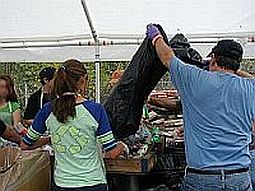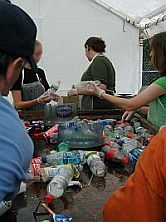Recycling at Fairs, Festivals and Outdoor Events
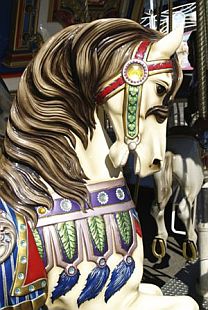 |
Recycling Is The Law!Connecticut’s recycling laws and statutes require everyone in the state to recycle whether they are at home, at work, school, or at a special event. Special event organizers must make provisions for recycling.The items required to be recycled in accordance with Section 22a-208v and Section 22a-256a of the Connecticut General Statutes and Section 22a-241b of the Regulations of the Connecticut State Agencies include:
_______________________
In addition to the state mandated recyclables listed above, check your local recycling contact to learn about additional materials you may be required to recycle.
|
How Do I Plan For Recycling
at My Event?
A well planned event requires cooperation, coordination, dedication and attention to details. One important detail is managing all the trash and recyclables the event will generate.
Identify the types of materials you expect to generate
Try to predict the types of trash and recyclables that may be generated at your event. Identify what types of activities are being planned at your event – food, crafts, animal exhibits, games, rides? Each type of activity will generate a different type or types of waste.
Organize
An individual or a committee should work on identifying what materials you anticipate the event will generate – and then create a system parallel to your trash collection to recover recyclables including beverage containers, newspaper, cardboard, manure and food.
Ask vendors, concessionaires, and others what they plan to bring with them/how they will sell their food. They may bring cardboard, polystyrene, cardboard or plastic food containers, napkins, paper or plastic cups and plates, plastic utensils, plastic soda bottles, metal cans, or glass bottles. Next, work with vendors, concessionaires, and haulers to identify how to reduce or recycle more of the waste stream.
- Allowing only recyclable containers for beverages (i.e. no paper cups, just cans of soda)
- Offering reusable beverage containers, such as mugs or pitchers, as promotional items for your event. Be aware that employees at concession stands must be trained how to refill them to minimize the risk of contamination. Check with your local health officials for details.
- Purchasing durable decorations and signs that can be used year after year.
- Requiring all concessionaires and vendors to use the same type of recyclable cups, glasses, or food containers. Work with them to identify suppliers and markets for the recyclables.
- Including information in all vendor contracts outlining that recycling is required. Be sure to give them enough information so they know how to prepare materials for recycling.
- Coordinating the collection of recyclables from vendors and the general public who attend the event.
- Making certain all vendors and their employees know about the recycling program and where bins or barrels are located.
- Sharing recycling bins with other local events who hold their festivities on a different date than your event.
Design Your Event Recycling Program
Once you know the types materials the event will generate, you can determine what you plan to recover for recycling. Once you know what you need to collect, you need to determine how the material will be collected (bin types), the number of bins you will need for your event, and how to make it easy for visitors to understand how they can recycle. The best way to encourage visitors to recycle is to create a parallel collection system that you’ve already created for your trash.Be sure that recycling bins or barrels are readily available and easily accessible. Locate recycling bins or barrels close to trash receptacles near concession areas, rest rooms, entrances, and exits, and make sure they are clearly marked. Consider signs, color, and style to mark the difference between trash and recycling containers. Remember, event goers are not always as attentive as you may want them to be.
-
Place recycling bins near every trash barrel
-
Recycling bins should be well marked and look different from trash barrels
Recycling "stations" staffed by volunteers who assist the public may be necessary the first year you implement the recycling program at your event.
Develop a way to monitor the recycling barrels or bins during the event. Monitoring should help reduce contamination in the recycling bin and help you understand if you need to make changes in your program.
You will also need a system for emptying the recycling bins:
-
Who will empty the recycling bins?
-
How will recyclables be transported?
-
Will recyclables be transferred to a larger container, dumpster or roll-off?
-
Have you communicated with your hauler?
-
How frequently will the larger container need to be emptied?
-
Do the recyclables need to be sorted?
Your options will vary depending on the size of the event. Be realistic — work with your hauler to identify how you can best capture recyclables.
Animal Waste
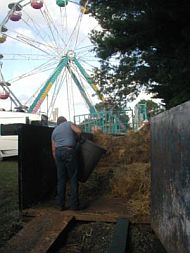 Many of our summer events include agricultural fairs that feature livestock, which generate a large amount of manure and animal bedding.
Many of our summer events include agricultural fairs that feature livestock, which generate a large amount of manure and animal bedding.
Every animal barn should have a system to gather manure and bedding from the building and bring it to a central location. Manure may be composted on site at the fairgrounds or transported to facilities that are permitted to accept animal manure and bedding.
Contact your hauler for suggestions to collect manure and animal bedding at your event. Make sure animal waste is stored far away from concession areas and in a location that reduces the risk of contaminating it with other trash. Work with animal exhibitors to ensure proper management.
Special Wastes
Any special wastes associated with your event, such as hydraulic fluid, motor oil, tires, batteries, fluorescent bulbs, and medical wastes (sharps) cannot be placed in the trash. Discuss management of these items with your hauler. Make sure everyone involved with your event clearly understands how they should handle these materials.
Vegetable Oil/Fryer Grease
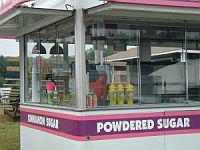 Used vegetable oil from cooking and frying should not be placed down storm drains, in bathrooms or sewer systems or on fairgrounds. If possible, the used cooking oil should be rendered.
Used vegetable oil from cooking and frying should not be placed down storm drains, in bathrooms or sewer systems or on fairgrounds. If possible, the used cooking oil should be rendered.
Many small fairs and festivals require vendors to take used cooking oil waste with them. Some even include a clause in the vending contract that if they leave the oil behind and do not remove it, they will be fined.
Contracts
Most special events require contracts with haulers, concessionaires, owners of the event site, and others. Be certain that all of these contracts clearly define how trash and recyclables will be managed and who is responsible. Never assume that the waste contract automatically covers recycling too.
Other things to consider while writing a contract:
-
This web page outlines the mandated recyclables for the state of Connecticut. Every municipality in CT also has its own ordinances – which often include additional mandated recycling materials. Check with your municipal recycling coordinator to learn about local recycling ordinances.
-
Check with the owners of the event site or their maintenance staff. What trash and recycling services do they provide? Do they have bins or barrels you can use for trash and recycling? Do you need to arrange for pickup when they become full? Whose staff will empty them? How much will it cost?
-
Check your contracts with concessionaires and vendors. Do you clearly state how recycling will be done at your event and who is responsible? Is there a penalty for failure to comply? Are you requiring them to use specific items for serving the public? Are they required to train their employees how to recycle or refill reusable containers?
Discuss the following issues with your hauler ahead of time and write them into your contract:
-
How many bins or barrels will be needed for trash and recycling and who will supply them? Where will they be located?
-
Who is responsible for emptying trash and recycling containers? How often and where will they be emptied?
-
Where will dumpsters (and animal waste sites) be located? How often will they be emptied? What time of day?
-
How will special wastes, including manure and animal bedding be managed?
Fundraising PossibilitiesSome events have partnered with local youth groups or non-profit agencies to help them run the recycling operation at their event.
The Durham Fair is a very large event with 150,000 - 250,000 people attending over four days. Fair organizers partner with two different scout troops to manage trash and recycling collection, litter patrol, and sorting recyclables for the end-market. The scouts sort through the recyclables recovering glass, metal and plastic beverage containers. The 5-cent deposit containers are redeemed and fund scout programming. Non-deposit containers go to the town's transfer station for recycling.
|
Education, Promotion and Marketing
Education is the key to successfully managing recyclables and solid waste at your event. Haulers, concessionaires, visitors, volunteers, maintenance/grounds people, and the media — all need to be made aware of your program. Here are some tips:
-
Keep your messages and directions simple.
-
Appeal to peoples’ concern for the environment and their civic pride to encourage participation.
-
Clearly identify your trash and recycling containers — use distinct colors, put signs on top and on the sides of containers, use pictures as well as words.
-
Enlist local groups or clubs to help promote and manage your program.
-
Give a consistent recycling message throughout the event — use the same signs and colors at all sites.
-
If recycling cannot be done at every location where trash is collected, post a sign giving the location of the recycling stations.
-
Remember recycling varies from community to community. Be sure that everyone knows what you are recycling at your location. Don’t assume anything.
-
Print brochures and posters on recycled paper.
Program Evaluation
After your event is over, discuss recycling and waste management with your staff, concessionaires, vendors, property owners, and haulers. What worked? What didn’t? How can you improve the program for next year? How can you make it easier for everyone to participate?
Who’s Already Doing It?
Mansfield Festival on the Green
CT Folk Festival/Green Expo
Branford Fest!
Bethlehem Fair
Taste!
Durham Agricultural Fair
Hartford County 4-H Festival
North Haven Fair
Berlin Fair
Norwalk Oyster Festival
Common Ground Fair, Maine Organic Farmers & Gardeners Association
City of Coachella, California (provides incentives to have people recycle)
Austin City Limits Music Festival
Are You Recycling at Your Event?
We welcome your own stories of how you are reducing, reusing, recycling or composting at your event. If you’d like to share your ideas, successes and/or resources, please contact Sherill Baldwin at 860-424-3440.
Content Last Updated February 2020


